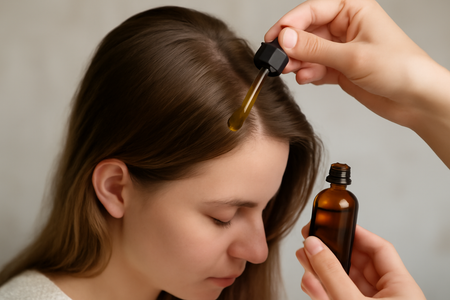
Top natural oils for sensitive scalp care
Jojoba oil
Jojoba oil is renowned for its ability to mimic the natural oils produced by the scalp, known as sebum. This makes it an excellent choice for those with sensitive scalps, as it helps maintain the scalp's natural balance without causing irritation. Jojoba oil is non-comedogenic, meaning it won't clog pores, and its gentle nature makes it suitable for frequent use. Regular application can soothe and hydrate the scalp, providing relief from dryness and irritation.
Argan oil
Argan oil is another top pick for sensitive scalp care due to its soothing properties. Rich in essential fatty acids, it helps reduce inflammation and provides deep moisture without leaving a greasy residue. Argan oil is particularly beneficial for maintaining overall scalp health, as it nourishes and protects against environmental stressors. Its lightweight texture makes it easy to incorporate into your routine, whether through direct application or as part of a soothing scalp treatment.
Sweet almond oil
Sweet almond oil is favored for its hypoallergenic properties, making it a safe choice for those prone to allergic reactions. Its gentle moisturizing effects can help alleviate dryness and discomfort, while its rich vitamin content supports a healthy scalp environment. Sweet almond oil is easily absorbed, providing lasting hydration without weighing down the hair.
Coconut oil (fractionated/organic)
Coconut oil, particularly in its fractionated form, offers excellent hydration and soothing benefits for sensitive scalps. It's important to use coconut oil in moderation to avoid potential buildup, which can lead to further irritation. When used correctly, coconut oil can help lock in moisture and provide a protective barrier against external irritants.
Tea tree oil (diluted)
Tea tree oil is known for its antimicrobial properties, which can be beneficial for maintaining a healthy scalp. However, due to its potency, it's crucial to dilute tea tree oil before application to prevent irritation. Mixing a few drops with a carrier oil like jojoba or sweet almond oil can create a soothing blend that addresses both sensitivity and potential scalp issues.
Incorporating oils into a sensitive scalp routine
Patch testing and safety tips
Before introducing any new oil into your hair care routine, performing a patch test is essential. This involves applying a small amount of the oil to a discreet area of your skin and waiting 24 hours to check for any adverse reactions. Using pure, cold-pressed oils without harsh additives ensures you receive the full benefits without the risk of irritation.
DIY recipes and application methods
Creating your own scalp treatments can be a rewarding way to tailor care to your specific needs. Consider mixing oils with soothing agents like aloe vera for enhanced benefits. For a pre-wash scalp soak, combine a few drops of your chosen oil with warm water and massage gently into the scalp. Alternatively, an overnight mask can provide intensive hydration and relief from discomfort.
Complementary haircare practices
In addition to using natural oils, adopting a gentle hair care routine can significantly benefit a sensitive scalp. Opt for sulfate-free shampoos that cleanse without stripping natural oils, and consider reducing the frequency of washes to maintain the scalp's natural balance. For those who style with heat, using a heat protectant spray is advisable to minimize damage and protect sensitive skin.
Addressing common concerns
Can I use essential oils on a sensitive scalp?
While essential oils are popular for their therapeutic properties, using them undiluted on a sensitive scalp can lead to irritation. It's important to dilute essential oils with a carrier oil like jojoba or sweet almond oil before application. This not only reduces the risk of adverse reactions but also allows you to enjoy the benefits of essential oils safely.
How do I know which oil is right for me?
Choosing the right oil for your sensitive scalp involves understanding your specific needs and preferences. Consider factors such as your scalp's oiliness, any allergies you may have, and your desired outcome. Starting with a well-tolerated oil like jojoba or sweet almond can be a safe bet. Conducting a patch test is also a valuable step in ensuring the oil suits your skin.
Practical tips for managing scalp sensitivity
To effectively manage a sensitive scalp, it's important to avoid harsh hair treatments and minimize heat styling. These practices can exacerbate irritation and dryness. Instead, focus on gentle hair care methods. Using tools like a boar bristle brush can help distribute natural oils evenly, reducing the need for additional products and minimizing irritation.
Frequently asked questions
Which oil is best for soothing an itchy scalp?
For soothing an itchy scalp, jojoba oil is often recommended due to its ability to mimic natural scalp oils and its non-irritating properties. Argan oil is also a popular choice for its anti-inflammatory benefits and ability to provide moisture without clogging pores.
What should I avoid in scalp oils?
When selecting scalp oils, it's important to avoid products with harsh additives, synthetic fragrances, and potential allergens. Opt for pure, cold-pressed oils that do not contain unnecessary fillers or chemicals. This ensures that you are using a product that is gentle on your sensitive scalp.
 2-5 day delivery
2-5 day delivery
 25.000+ satisfied customers
25.000+ satisfied customers
 Satisfaction Guarantee
Satisfaction Guarantee

























